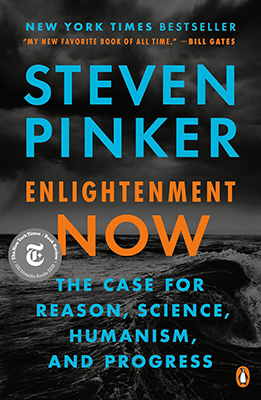Enlightenment Now
“Enlightenment Now: The Case for Reason, Science, Humanism, and Progress” by Steven Pinker is a comprehensive exploration of the progress humanity has made and continues to make through the application of reason, science, and humanist values. Here’s a summary of the key themes and arguments presented in the book:
Historical Perspective: Pinker argues that humanity has made significant progress across various domains, including health, prosperity, safety, peace, and happiness. He uses historical data and trends to demonstrate that, despite ongoing challenges, the world is generally improving in terms of quality of life for most people.
Enlightenment Values: The book champions the values of the Enlightenment, such as reason, science, humanism, and optimism about the future. Pinker argues that these values have been instrumental in driving progress and improving human well-being over the centuries.
Data-Driven Analysis: Pinker supports his arguments with a wealth of data and statistics, showing trends in areas like life expectancy, poverty reduction, literacy rates, and global peace. He uses this data to counter pessimistic narratives about the state of the world.
Critique of Pessimism: Pinker challenges prevailing pessimistic views that suggest the world is deteriorating or facing irreversible crises. He acknowledges persistent challenges but argues that focusing on progress and continuing to apply humanist principles can lead to further improvements.
Defense of Science and Rationality: Pinker defends the importance of science as a tool for understanding the world and solving problems. He critiques anti-science attitudes and advocates for evidence-based decision-making in policy and public discourse.
Human Flourishing: Central to Pinker’s argument is the idea that the goal of society should be to promote human flourishing, which he believes is best achieved through the values of reason, science, and humanism.
Controversies and Responses: “Enlightenment Now” has sparked debate among scholars and commentators. Critics argue that Pinker’s optimism may overlook persistent inequalities, environmental challenges, and cultural critiques of modernity. Supporters appreciate his data-driven approach and call to celebrate progress while acknowledging areas for improvement.
Overall, “Enlightenment Now” is a provocative and optimistic exploration of human progress and the potential of Enlightenment values to continue improving the human condition in the 21st century.

